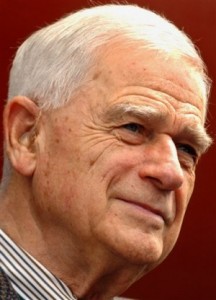I see that former-Senator Mark Hatfield has died, and one image repeatedly comes to mind—the one of his walking quietly into a Wednesday night service in downtown Chicago, unnoticed by most everyone.
But let me back up.
 I first met Senator Hatfield when I was working under a National Endowment for the Humanities grant while a graduate student at Vanderbilt in the 1970s. We were taking profs from a dozen Nashville colleges into the community (to churches, civic clubs, libraries, etc.) to talk about ethics, and my boss, Vanderbilt philosophy prof John Lachs, had invited some fascinating guests to town for lectures. I got to chauffeur them around to the radio and TV stations for interviews. (It was quite a list, including Boston University president John Silber and Amherst College historian Henry Steele Commager.)
I first met Senator Hatfield when I was working under a National Endowment for the Humanities grant while a graduate student at Vanderbilt in the 1970s. We were taking profs from a dozen Nashville colleges into the community (to churches, civic clubs, libraries, etc.) to talk about ethics, and my boss, Vanderbilt philosophy prof John Lachs, had invited some fascinating guests to town for lectures. I got to chauffeur them around to the radio and TV stations for interviews. (It was quite a list, including Boston University president John Silber and Amherst College historian Henry Steele Commager.)
Senator Hatfield was one of these distinguished visitors, and I was especially pleased to meet him, an unashamed, articulate evangelical in the halls of power. I didn’t agree with his pacifist orientation or his particular opposition to the Vietnam War, but good people differed over that. What I did admire was his willingness to testify freely and winsomely to his faith in Christ, and this while based in Oregon, far outside the Bible Belt. I think he was wrong to vote against military appropriations but right to vote for Clarence Thomas’s confirmation. It was always interesting to see where he would land on the issues, and, perhaps, most surprising was his prominent appearance on the platform at President Reagan’s inauguration, where he served as the Senate’s chairman for the ceremony.
I can’t remember what he said on that Nashville visit, but I do recall his humble, gracious spirit. A senator should expect a better ride than I could offer him, but I arrived in a big old Chevy pickup, our project’s vehicle for hauling displays, coffee urns, literature racks, projectors, etc. around town. After stowing his luggage under the tarp, I half expected him to roll his eyes or sit in pained silence over this “good ole boy” treatment, but he put me right at ease with his smile and easy conversation.
Then, about five years later, when a prof at Wheaton, I was invited to bring some Wednesday night talks at Fourth Presbyterian up by Water Tower Place in Chicago. Not long into my message, I saw Senator Hatfield slip into the meeting – and not get up and leave when he saw how lame the evening’s fare was.
Afterwards, I went down to say hello and see if he remembered our time in Nashville – and he did. I asked what brought him to Fourth Pres that night, and it was just that he wanted to go to church on Wednesday night. He was in town for something or other and found himself in a hotel nearby. He saw the church lights on and decided to join in whatever was going on there.
The writer of Hebrews urges his readers, “Let us not give up meeting together, as some are in the habit of doing” (10:25), and it’s clear that Senator Hatfield had internalized that message. But he didn’t just not neglect fellowship; he sought it out when neglecting to do so would have gone unnoticed. And his “ministry of presence” that night meant a lot to this old pickup driver from Tennessee.